Sheep Offer Ewe-nique Benefits:
In the area of sustainable agriculture, farmers are continually exploring innovative and eco-friendly practices to enhance productivity while minimizing environmental impact. One such unconventional yet highly effective method involves the integration of miniature sheep into orchards and vineyards.
These pint-sized grazers offer a host of benefits that contribute to the overall health and productivity of orchards. In this article, we will delve into the various reasons why miniature sheep are gaining popularity among orchard owners as an environmentally conscious and practical solution.

1. Sheep for Natural Weed Control
One of the primary advantages of incorporating miniature sheep into orchards and vineyards is their exceptional ability to control grass and weeds. Mini sheep are enthusiastic grazers, and their small size allows them to navigate through orchard rows with ease, without doing damage to the trees. As they graze, they target unwanted vegetation, effectively managing weed growth without the need for chemical herbicides.
This not only reduces the environmental impact but also minimizes the competition for nutrients and water between the weeds and the fruit trees, promoting the overall health of the orchard ecosystem.
2. Fertilization via Sheep Manure
Miniature sheep contribute to orchard fertility through their natural fertilization process. As they graze, they deposit nutrient-rich manure throughout the orchard. The manure serves as an organic fertilizer, improving soil biota, enhancing soil fertility and providing essential nutrients to the fruit trees.
Unlike synthetic fertilizers, which can have negative environmental implications, the use of miniature sheep manure promotes a sustainable and closed-loop system within the orchard.
3. Grazing Management and Orchard Maintenance
Miniature sheep are well-suited for orchard environments due to their manageable size and gentle nature. Orchard and vineyard owners can implement rotational grazing systems, strategically moving the sheep from one area to another. This controlled grazing helps prevent overgrazing in specific sections of the orchard, allowing vegetation to regrow naturally.
Additionally, the constant movement of miniature sheep helps greatly in orchard floor management, preventing the buildup of debris and fallen fruit that could attract pests and diseases.

4. Browsing Behavior – Natural Pest Control:
Beyond weed control, miniature sheep also engage in browsing behavior, nibbling on shrubs, low-hanging branches, and fallen fruit. This behavior helps in reducing potential hiding spots for pests and keeps the orchard tidy.
By consuming fallen fruit, miniature sheep play a role in pest management, as certain pests and diseases often breed in decaying fruit on the orchard floor. This proactive approach to pest control reduces the need for chemical interventions, promoting a healthier and more sustainable orchard environment.
5. Stress-Free Low Pruning
Pruning is an essential practice in orchard management, promoting better air circulation, sunlight exposure, and overall tree health. Miniature sheep contribute to stress-free pruning by naturally nibbling at low-hanging branches and excess foliage. This reduces the workload for orchard owners and eliminates the need for mechanical pruning of low branching, which can be labor-intensive and environmentally impactful.
The symbiotic relationship between miniature sheep and fruit trees creates a harmonious balance that benefits both the orchard and its caretakers.
6. Mini Sheep for Soil Health and Erosion Prevention
Miniature sheep play a crucial role in maintaining soil health within orchards and vineyards. Their gentle hoof action helps aerate the soil, promoting better water infiltration and reducing compaction. This is particularly important for orchards where heavy machinery might cause soil damage.
Additionally, the constant movement of miniature sheep prevents soil erosion by reducing surface runoff and promoting the development of a healthy ground cover. As a result, orchard soils remain fertile, structurally sound, and resilient to environmental stressors.
7. Biodiversity Enhancement
The introduction of miniature sheep into orchards contributes to the enhancement of biodiversity. These small grazers create micro-habitats within the orchard, attracting beneficial insects and other wildlife. The diverse ecosystem that emerges supports natural predators of orchard pests, such as spiders, ladybugs, and predatory beetles.
By fostering a balanced and biodiverse environment, orchard owners can reduce their reliance on chemical pesticides, creating a more sustainable and resilient agricultural system.
Conclusion
In conclusion, the integration of miniature sheep into orchards and vineyards offers a multifaceted approach to sustainable farming. From natural weed control and fertilization through manure to stress-free pruning and pest management, these compact grazers bring a plethora of benefits to orchard ecosystems.
By embracing this eco-friendly and innovative solution, orchard owners can not only enhance the productivity and health of their fruit trees but also contribute to the broader goal of sustainable agriculture. As we continue to explore novel and environmentally conscious practices, miniature sheep stand out as valuable partners in cultivating healthy, vibrant orchards for a greener future.
Read about the Benefits of Using Miniature Rams over Normal Size Ewes